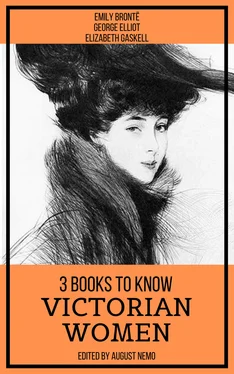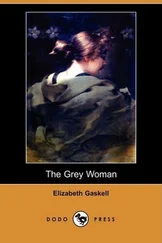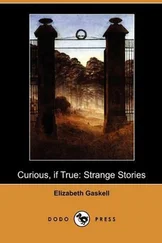“I can sleep on a chair in this room,” I replied.
“No, no! A stranger is a stranger, be he rich or poor; it will not suit me to permit any one the range of the place while I am off guard!” said the unmannerly wretch.
With this insult, my patience was at an end. I uttered an expression of disgust and pushed past him into the yard, running against Earnshaw in my haste. It was so dark that I could not see the means of exit; and, as I wandered round, I heard another specimen of their civil behaviour amongst each other. At first the young man appeared about to befriend me.
“I’ll go with him as far as the park,” he said.
“You’ll go with him to hell!” exclaimed his master, or whatever relation he bore. “And who is to look after the horses, eh?”
“A man’s life is of more consequence than one evening’s neglect of the horses: somebody must go,” murmured Mrs. Heathcliff, more kindly than I expected.
“Not at your command!” retorted Hareton. “If you set store on him, you’d better be quiet.”
“Then I hope his ghost will haunt you; and I hope Mr. Heathcliff will never get another tenant till the Grange is a ruin!” she answered sharply.
“Hearken, hearken, shoo’s cursing on ‘em!” muttered Joseph, towards whom I had been steering.
He sat within earshot, milking the cows by the light of a lantern, which I seized unceremoniously, and, calling out that I would send it back on the morrow, rushed to the nearest postern.
“Maister, maister, he’s staling t’ lanthern!” shouted the ancient, pursuing my retreat. “Hey, Gnasher! Hey dog! Hey, Wolf, holld him, holld him!”
On opening the little door, two hairy monsters flew at my throat, bearing me down and extinguishing the light; while a mingled guffaw from Heathcliff and Hareton, put the copestone on my rage and humiliation. Fortunately, the beasts seemed more bent on stretching their paws and yawning and flourishing their tails, than devouring me alive; but they would suffer no resurrection, and I was forced to lie till their malignant masters pleased to deliver me: then, hatless and trembling with wrath, I ordered the miscreants to let me out—on their peril to keep me one minute longer—with several incoherent threats of retaliation that, in their indefinite depth of virulency, smacked of King Lear. The vehemence of my agitation brought on a copious bleeding at the nose, and still Heathcliff laughed, and still I scolded. I don’t know what would have concluded the scene, had there not been one person at hand rather more rational than myself, and more benevolent than my entertainer. This was Zillah, the stout housewife; who at length issued forth to enquire into the nature of the uproar. She thought that some of them had been laying violent hands on me; and, not daring to attack her master, she turned her vocal artillery against the younger scoundrel.
“Well, Mr. Earnshaw,” she cried, “I wonder what you’ll have agait next! Are we going to murder folk on our very doorstones? I see this house will never do for me—look at t’ poor lad, he’s fair choking! Wisht, wisht! you mun’n’t go on so. Come in, and I’ll cure that: there now, hold ye still.”
With these words she suddenly splashed a pint of icy water down my neck, and pulled me into the kitchen. Mr. Heathcliff followed, his accidental merriment expiring quickly in his habitual moroseness.
I was sick exceedingly, and dizzy and faint; and thus compelled perforce to accept lodgings under his roof. He told Zillah to give me a glass of brandy, and then passed on to the inner room; while she condoled with me on my sorry predicament, and having obeyed his orders, whereby I was somewhat revived, ushered me to bed.
––––––––
WHILE leading the way upstairs, she recommended that I should hide the candle, and not make a noise; for her master had an odd notion about the chamber she would put me in, and never let anybody lodge there willingly. I asked the reason. She did not know, she answered: she had only lived there a year or two; and they had so many queer goings on, she could not begin to be curious.
Too stupefied to be curious myself, I fastened the door and glanced round for the bed. The whole furniture consisted of a chair, a clothespress, and a large oak case, with squares cut out near the top resembling coach windows. Having approached this structure I looked inside, and perceived it to be a singular sort of old-fashioned couch, very conveniently designed to obviate the necessity for every member of the family having a room to himself. In fact, it formed a little closet, and the ledge of a window, which it enclosed, served as a table. I slid back the panelled sides, got in with my light, pulled them together again, and felt secure against the vigilance of Heathcliff, and every one else.
The ledge, where I placed my candle, had a few mildewed books piled up in one corner; and it was covered with writing scratched on the paint. This writing, however, was nothing but a name repeated in all kinds of characters, large and small—Catherine Earnshaw, here and there varied to Catherine Heathcliff, and then again to Catherine Linton.
In vapid listlessness I leant my head against the window, and continued spelling over Catherine Earnshaw—Heathcliff—Linton, till my eyes closed; but they had not rested five minutes when a glare of white letters started from the dark as vivid as spectres—the air swarmed with Catherines; and rousing myself to dispel the obtrusive name, I discovered my candle wick reclining on one of the antique volumes, and perfuming the place with an odour of roasted calf-skin. I snuffed it out, and, very ill at ease under the influence of cold and lingering nausea, sat up and spread open the injured tome on my knee. It was a Testament, in lean type, and smelling dreadfully musty: a flyleaf bore the inscription —“Catherine Earnshaw, her book,” and a date some quarter of a century back. I shut it, and took up another, and another, till I had examined all. Catherine’s library was select, and its state of dilapidation proved it to have been well used; though not altogether for a legitimate purpose: scarcely one chapter had escaped a pen-and-ink commentary—at least, the appearance of one—covering every morsel of blank that the printer had left. Some were detached sentences; other parts took the form of a regular diary, scrawled in an unformed childish hand. At the top of an extra page (quite a treasure, probably, when first lighted on) I was greatly amused to behold an excellent caricature of my friend Joseph—rudely, yet powerfully sketched. An immediate interest kindled within me for the unknown Catherine, and I began forthwith to decipher her faded hieroglyphics.
“An awful Sunday!” commenced the paragraph beneath. “I wish my father were back again. Hindley is a detestable substitute—his conduct to Heathcliff is atrocious—H. and I are going to rebel—we took our initiatory step this evening.
“All day had been flooding with rain; we could not go to church, so Joseph must needs get up a congregation in the garret; and, while Hindley and his wife basked downstairs before a comfortable fire—doing anything but reading their Bibles, I’ll answer for it—Heathcliff, myself, and the unhappy plough-boy, were commanded to take our prayer-books, and mount: were ranged in a row, on a sack of corn, groaning and shivering, and hoping that joseph would shiver too, so that he might give us a short homily for his own sake. A vain idea! The service lasted precisely three hours; and yet my brother had the face to exclaim, when he saw us descending, ‘What, done already?’ On Sunday evenings we used to be permitted to play, if we did not make much noise; now a mere titter is sufficient to send us into corners!
Читать дальше












